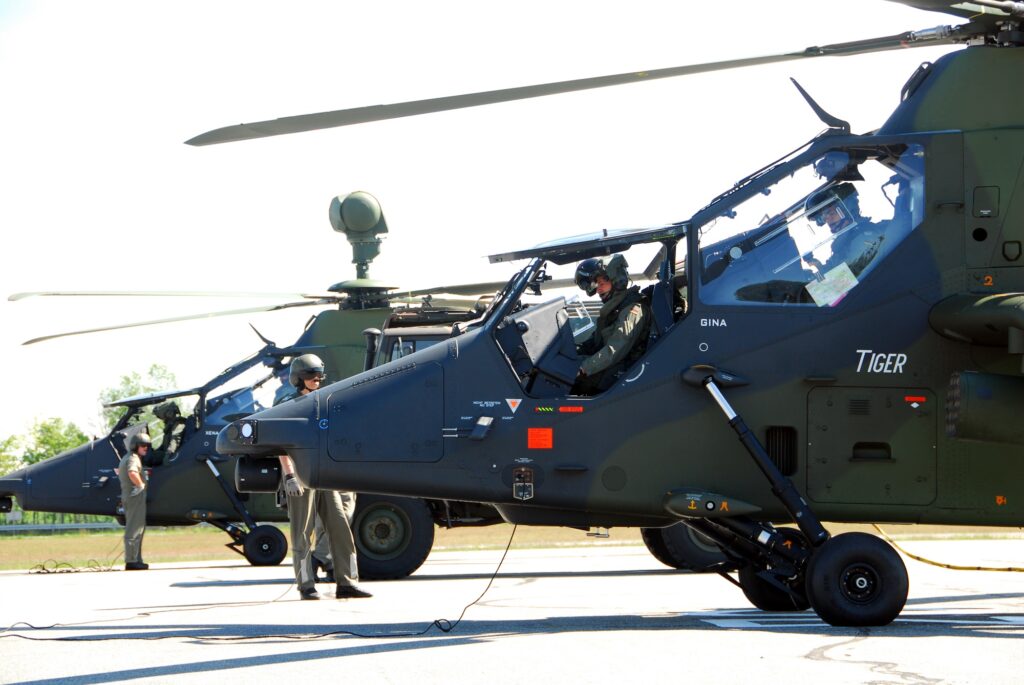Unwilling to modernize its Tiger helicopter fleet, Germany plans to retire the model between 2031 and 2038.
In an interview with Süddeutsche Zeitung, the German Ministry of Defense confirmed that the Tiger helicopter would be discontinued. The decision was motivated by the low availability of the fleet of 51 helicopters, which discouraged Germany from joining France and Spain in a mid-life modernization program.
“Participation in the Tiger Mk III program would have been very risky in terms of costs and delays,” a spokesperson for the ministry said.
The controverted Tiger Mk3 program
Designed in the early 1980s amid the Cold War, the Franco-German Tiger combat helicopter was adopted by the two countries’ respective armies in 2009. Initially thought of as an anti-tank platform that could counter a Soviet invasion, it was eventually transformed into a multirole attack helicopter, with several variants being developed to fit the needs of its operators.
The MK3 modernization program focuses on collaborative combat with a battlefield management system. For example, it should include the Manned Unmanned Teaming (MUM-T) which allows for a helicopter to control a drone. The Tigers of the French Army Light Aviation would also be able to share information with the recently-induced frontline fighting vehicles of the Scorpion program thanks to a new battlefield management system.
In March 2021, reports emerged that despite having formalized the modernization of the Tiger three years prior, the German Ministry of Defense was now reconsidering its involvement in the program. On both sides of the Atlantic, media outlets reported that Berlin would have been interested in acquiring the Boeing AH-64 Apache attack helicopter instead.
This echoed a similar decision made by Australia in January 2021. After publicly denouncing the low availability and high maintenance cost of the Tiger helicopter, Australia’s Defense Minister Linda Reynolds announced the acquisition of 29 Boeing Apaches from 2025 as a replacement.
Though Germany’s withdrawal was not confirmed, in March 2022, Airbus announced that the Tiger Mk3 attack helicopter upgrade program was only moving forward on behalf of the French and Spanish Armament General Directorate.
The European Organisation for Joint Armament Cooperation (OCCAR) contracted the manufacturers involved in the project, namely Airbus Helicopters, Thales, and MBDA, to upgrade 42 aircraft for France and 18 for Spain, with “the possibility for Germany to later join.”
A European solution after all?
If the retirement of the German Tigers is now confirmed, they might not necessarily be replaced by the Apaches.
Indeed, in March 2023, Business Insider cited internal documents reporting that the German authorities were considering the acquisition of 82 Airbus H145M helicopters and equipping some of them with anti-tank capability.
However, the same documents showed that the decision was not unanimous within the Bundeswehr (the German Armed Forces) with some seeing it as a “purely political decision which ignores operational needs.”
The order has not yet been officially announced, though the ministry confirmed a budget plan would be presented by the end of 2023.
“The Bundeswehr plans to buy light attack helicopters available on the market,” the spokesperson assured Süddeutsche Zeitung.
In the past few years, several European programs involving Germany (MAWS, FCAS, Eurodrone) have stalled because of either financial or tactical divergence of opinions, creating tensions among industrials and politicians.
An order for Airbus helicopters, even as an interim solution, could act as a compromise to reassure other European countries while maintaining an industrial capability to produce combat helicopters in Germany.

